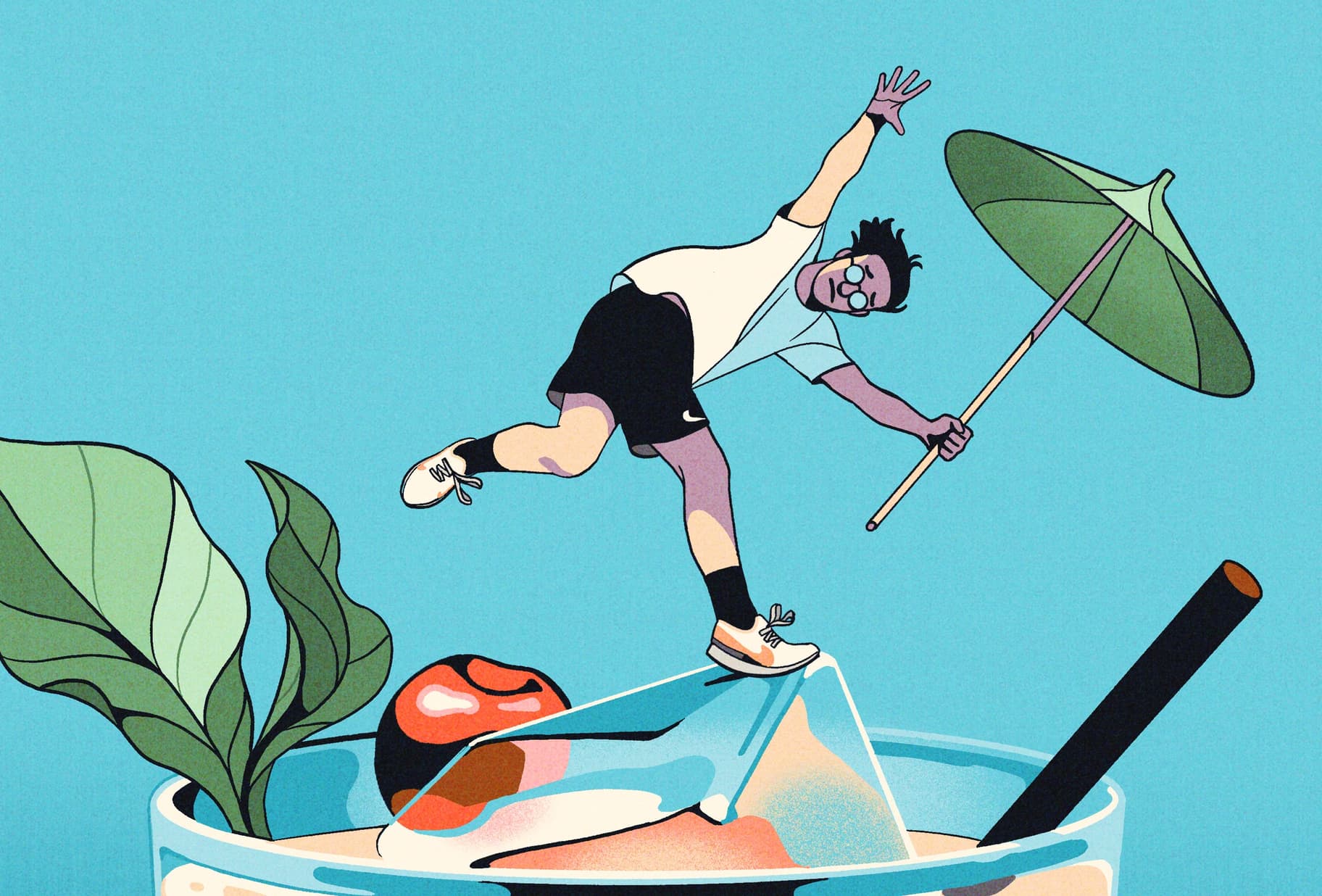Cheers to Better Recovery?
Coaching
Drinking after a workout might slow your normal muscle-building process—unless you do it right. With this guide, now you can.

If you like to end a long run at an outdoor bar or cap off a tough training session with a beer, welcome to the club. Frequent exercisers tend to drink more overall than those who don't exercise. And people in general often drink more on days they've worked out, research shows. But as sweet as that first sip can be, if you're not smart about your drinking, alcohol can put your gains and recovery on pause—but it doesn't have to.
How Booze Delays Your Bounce-Back
Not to be a buzzkill, but alcohol is technically toxic to your immune system. Depending on how much is consumed, alcohol may disrupt the body's normal inflammatory and hormonal responses. The more you have, the more likely it is to hurt your immunity, blood flow and rehydration, as well as delay your ability to repair and regenerate cells, including muscle tissue, according to a study in "Sports Medicine". Plus, having alcohol in your system close to bedtime can prevent you from entering the deeper stages of sleep, making it hard for you to clock enough muscle-repairing shut-eye, reports another recent study. So your recovery? It takes a hit in multiple ways.
And if you consume numerous drinks within four hours after exercise, you could further impair muscle recovery and growth by reducing muscle protein synthesis, according to research published in the journal "PLOS One". Researchers don't know exactly why that happens, but it likely has to do with alcohol by-products messing with signals your body typically relies on to kick-start muscle repair, says Matthew Barnes, PhD, a professor of sport and exercise and a researcher on alcohol and exercise at Massey University in New Zealand.
"Researchers don't know exactly why that happens, but it likely has to do with alcohol by-products messing with signals your body typically relies on to kick-start muscle repair".
Matthew Barnes
PhD, Professor of Sport and Exercise and Researcher on Alcohol and Exercise at Massey University
Finding the Balance
All of that isn't to say you can't or shouldn't enjoy a cold one after a sweaty session. But there's a right way and a wrong way to imbibe, and most of it comes down to the amount you drink. "The negative effects of alcohol that influence recovery and muscle adaptation are usually seen when amounts exceed 1 gram of alcohol per kilogram of body weight", says Barnes.
Don't worry about the maths: Barnes says as long as you follow the appropriate recommendations for moderate drinking—the Dietary Guidelines for Americans consider this to be up to one standard drink (that's 14 grams of alcohol, which equates to approx. 350ml of regular beer, 150ml of wine or 45ml of distilled spirits) per day for females and up to two per day for males—alcohol shouldn't be an issue for recovery and adaptation. (Men typically have a higher amount of the enzyme needed to metabolise alcohol and more body water to dilute it, so they can get away with drinking more.)
One new study published in the "Journal of the International Society of Sports Nutrition" found that moderate alcohol intake—in this case, one drink with a 5.4 percent alcohol content (that's a beer or vodka and soda) for women and two drinks for men—five times a week didn't affect the positive adaptations in VO2 max and grip strength after a 10-week HIIT programme. In other words, their drinks didn't seem to diminish the positive effect of their training.
And a review of studies published in the "Journal of Functional Morphology and Kinesiology" found that subjects who drank moderately in the hours after a resistance workout didn't appear to experience changes—for better or worse—in force, power, muscular endurance, soreness or rate of perceived exertion (how hard you think you're working) when tested up to 60 hours after exercise. The takeaway: "One or two post-workout drinks are unlikely to harm recovery, especially if you are used to consuming moderate amounts of alcohol", says Barnes.
The Best Bottoms-Up
As for what to reach for post-workout, consider an ice-cold beer. A study published in the "Journal of the International Society of Sports Nutrition" found that runners who drank water and a moderate amount of beer rehydrated as effectively as runners who had only water did. Why? Your body prioritises rehydration over the need to absorb alcohol (and beer has water in it).
There's not yet loads of research on which other drinks may be better choices for your recovery if you aren't into beer. You're probably best off choosing the drink that's calling your name, sipping it slowly so you can truly enjoy it and trying not to order another, says Barnes.
Either way, after training, always rehydrate with water and refuel with a mix of healthy carbs and protein before you start drinking, says Barnes. "This ensures you have the right balance in your system to start the recovery process", he explains. "Water dilutes the alcohol when it enters the bloodstream, and food will slow the absorption of alcohol, both of which reduce its negative effects on the body".
If one drink turns into three, don't kick yourself. Just like one bad meal won't wreck your results, one happy hour-turned-hours won't derail your overall progress either. It's when it becomes a regular part of your routine that you could do damage.

Take It Further
For more expert-backed guidance on mindset, as well as movement, nutrition, recovery and sleep, check out the Nike Training Club App.
Take It Further
For more expert-backed guidance on mindset, as well as movement, nutrition, recovery and sleep, check out the Nike Training Club App.